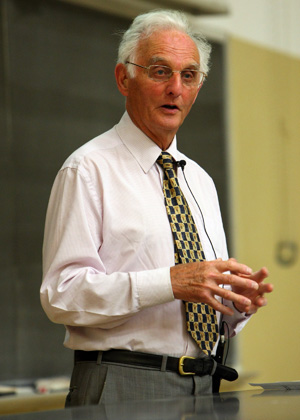 |
| Sir John Houghton speaks to ±«Óãtv students and faculty in the Dunn Building lecture hallÌý(Nick Pearce photo) |
While scientists have understood the physics of global warming for a couple of hundred years, he said, that change has never been documented with greater detail and accurate forecasts than in the past 50 years. Two huge technical advances have revolutionized the way scientists observe the Earth's atmosphere: the ability to observe the Earth from space through the use of satellites and computer modeling.
Over this century, the EarthÌýwill continue toÌýget warmer—by an average global temperature of 2 to 3 to 4 degrees over land masses and 1 to 2 degrees over the oceans. If this seems small, "we humans are going to find it very hard to cope with in the future," said Sir Houghton.
Ìý
The Welsh scientistÌýhas been at the forefront of the movement to inform the public about global warming and its effects. He was the co-chair of the Intergovernmental Panel on Climate Change (IPCC) when it was awarded the Nobel Peace Prize.
He maintains that he is hopeful that world can reduce its emissions and fossil fuel dependency.
"Why don't we get on with it?" he said. "I think I'll end on that note."
